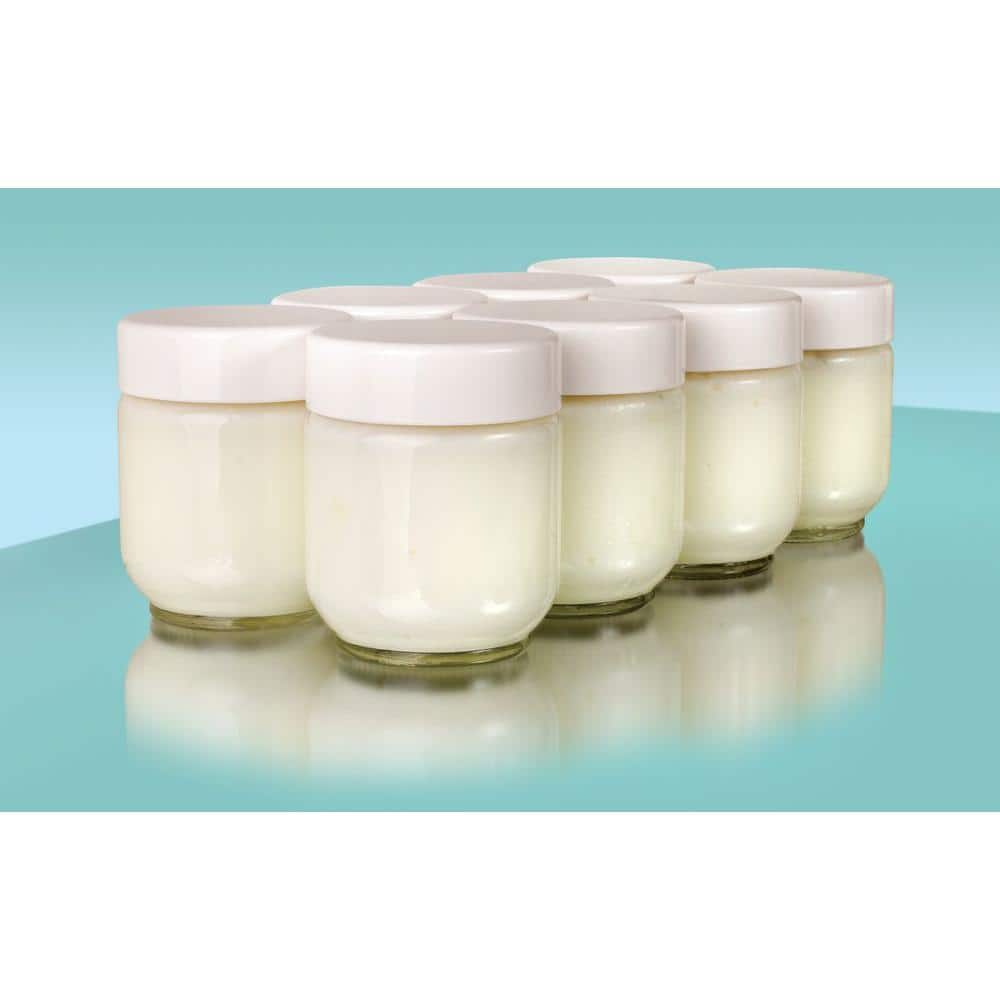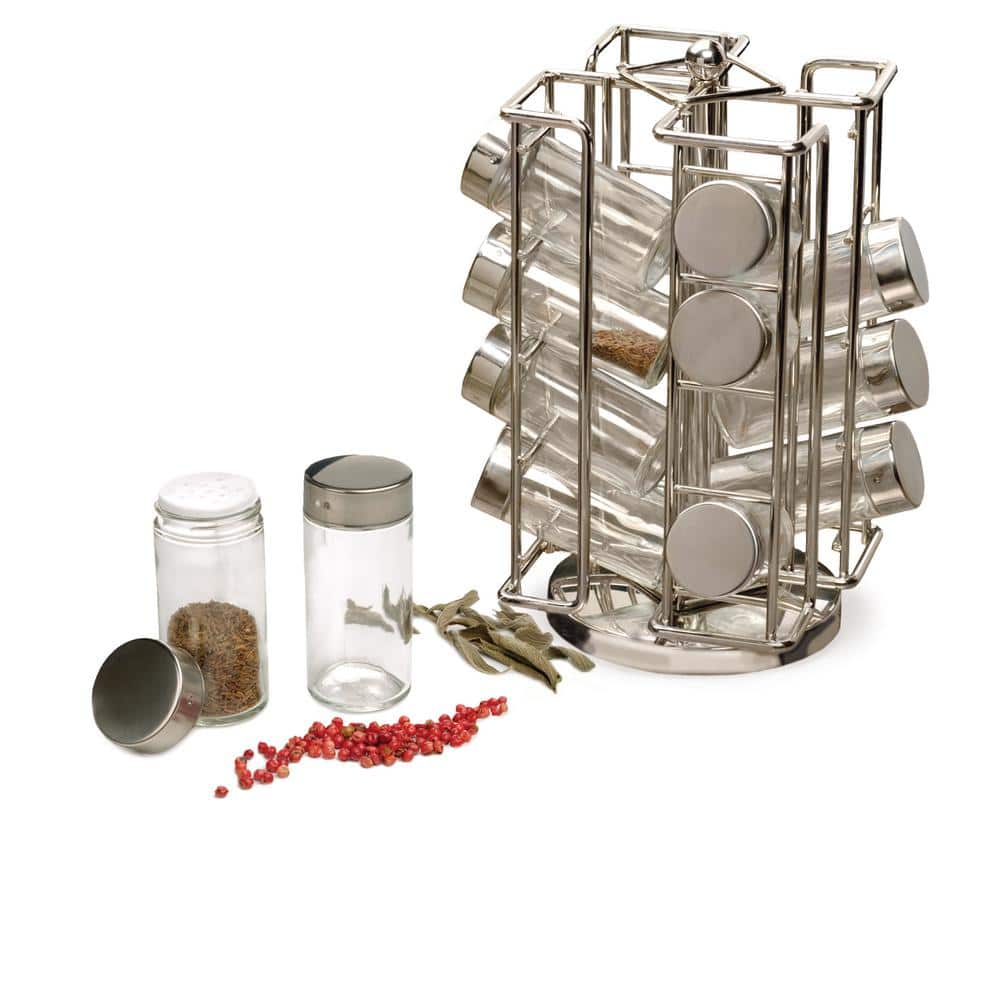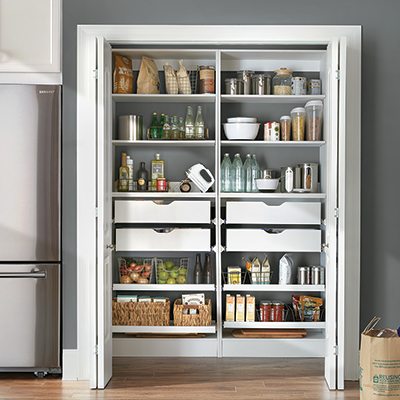How to Keep Pantry Items Fresh

Last updated September 7, 2023
The majority of the items you keep in your pantry fall under the category of non-perishable. You might have other food items that can lose their freshness if not properly stored. Keeping pantry items organized and stored well can extend their shelf life.
This guide will teach you tips and storage ideas for how to keep your pantry items fresh so you can get the most out of your dry goods, spices and more.
Table of Contents
Pantry Space Tips
Rules for Pantry Goods
Use Airtight Containers
Store Spices and Condiments in Shade
Keep Canned Goods Visible
Keep Olive Oil at Room Temperature
Pantry Space Tips
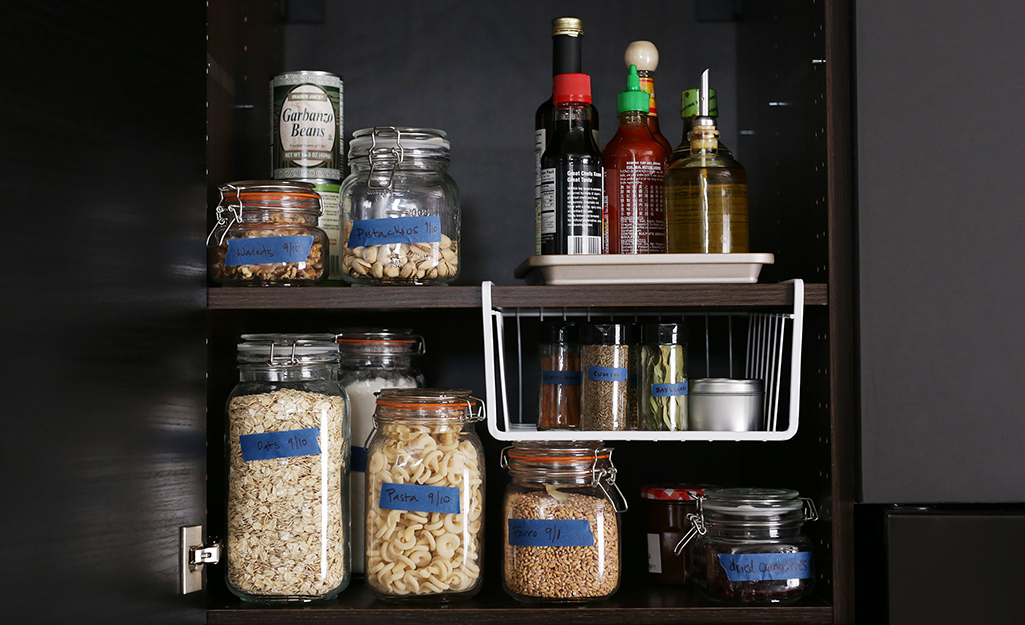
It's important to understand the environmental characteristics of your pantry. A pantry, by definition, is a cool, dark, dry space. That means your countertop is not an adequate substitute for a pantry. Neither is a cupboard right above your oven or a nook that is exposed to light.
- If your home doesn’t have a dedicated pantry space, you can use a kitchen cupboard or a closet that is away from heat. Ideally, this space won’t be too cramped because you need ample airflow within. Complement your space with shelves and organizers to arrange and access your goods in the most productive way possible.
- Part of your weekly pantry once-over should be a shelf wipe-down with cleaning tools. This will keep cleaning from becoming a daunting task.
- Make sure you’re using storage tools that work best for your space. Pantries come in all shapes and sizes, so there isn’t a one-size-fits-all answer to the organizing tools you should be using. Will magnetic spice canisters serve you best? Pull-out drawers? Stackable storage? Shop with your space in mind to make sure it ends up laid out in a useful way.
- Group like items together and create zones within your pantry using baskets or bins (or even sheet pans). Having all grains stored in one spot and spices in another will help you inspect the space more quickly and will keep things feeling tidy.
- Clear shelves are easier to scan and will help you maintain a useful pantry. Assess your pantry’s contents on a weekly basis and make restocking part of your weekly meal planning routine. This will keep things from getting overwhelming and help you avoid buying duplicates when doing a weekly shop.
- Clear containers allow you to keep tabs on their contents.
- Use painter’s tape to label the dry goods, nuts and spices you decant into sealable, reusable canning supplies.
Rules for Pantry Goods
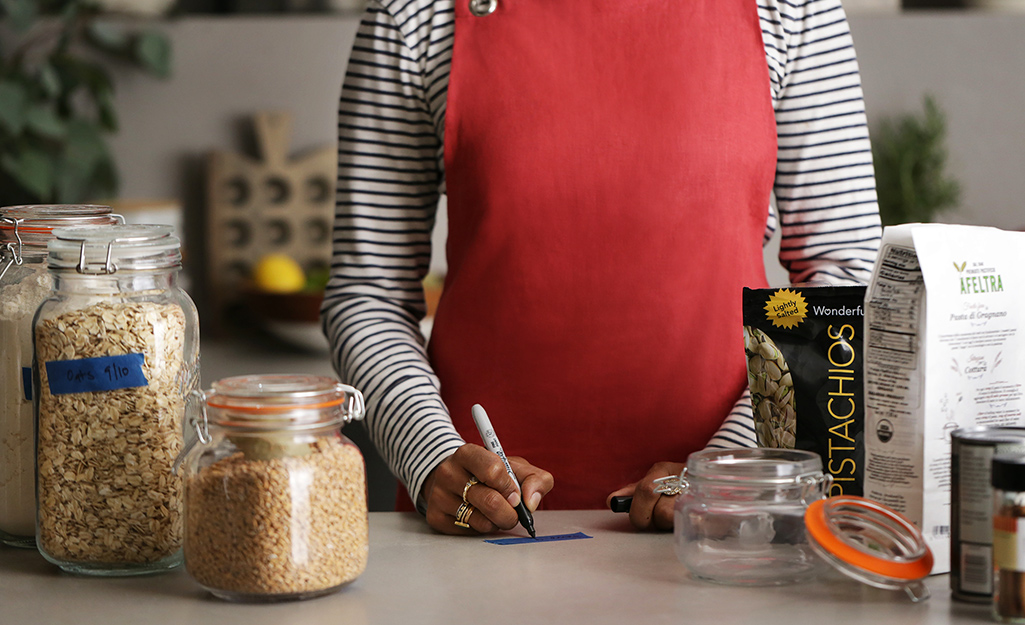
The easiest way to ensure that you are preparing and storing pantry goods appropriately is to understand the category-by-category rules. Though pantry goods commonly do not require refrigeration, they all have diverse needs.
Remember these rules for a pantry that is easy to use and filled with the freshest goods possible.
- Throw old items away without hesitation. If you allow packaged goods and cans to collect dust, you will be less likely to reach for them with confidence. This results in a vicious cycle in which old items build up.
- Light and air are the most common enemies when it comes to keeping certain items fresh. Items like coffee and spices need a darker environment.
- Keep package labels facing outward so they are as visible as possible.
- To deter bugs, drop a chili or bay leaf into your chosen storage container. It’s a sure-fire trick for grains.
Use Airtight Containers
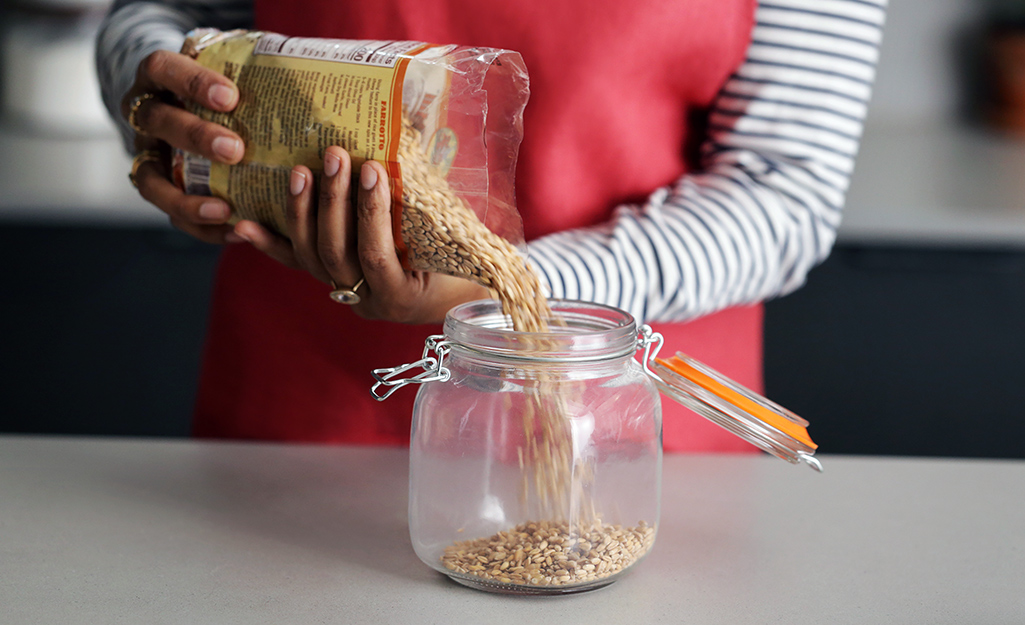
Airtight containers can extend the shelf life of food by blocking out moisture and are perfect for dry goods like flours, grains, lentils, nuts and dried pasta. If stored thoughtfully, dry goods can last in your pantry for at least six months, if not longer.
Most of us will not make it through a full package of flour, for example, in a single use. Once a dried good is opened, you should transfer it to a container. Your choice of reusable container should also be made of nonporous material. A glass container or high-quality silicone is ideal for a container like a cookie jar. This will keep the goods their freshest.
These containers should be clear so that you can see the contents and quickly determine which dry goods they contain. This will also make monitoring levels easier – you’ll know exactly when you need to restock.
Store Spices and Condiments in Shade

Spices are especially reactive to heat, air and humidity, so to keep them fresh, store them in a pantry and not next to your stove or in a sunny spot on your countertop.
Whole spices will last much longer than ground ones and can keep for up to two years. Buy any spices you use infrequently in whole form and grind them when you need them. You can easily grind spices in a blade coffee grinder.
Spices you use regularly will be fine pre-ground and last for up to six months as long as you follow storage rules. In addition to keeping them away from heat and light, be sure to store your spices in air-tight tins or small spice jars. Verify that your spice containers are made of non-porous material and that you have labels on all of them. This will allow you to keep track of which one’s are which.
Not all condiments are meant for the pantry, but all of these items are shelf stable and will last in your pantry for years:
- Hot sauce
- Vinegar
- Nut butters
- Honey
- Soy sauce
If you prefer a firmer texture for your nut butters, store them in your refrigerator. Before placing them there, turn them upside down in the pantry for an hour or two. Any oils that separate and settle at the top of the jar will mix with the rest of the jar’s contents. You can then give it a quick mix to create a uniform texture that will harden once you store the jar in the refrigerator.
Keep Canned Goods Visible

Canned goods last indefinitely. Keep a few cans of tomatoes and chickpeas on hand to use in a pinch. Just avoid sticking them somewhere out of sight. The trick to a fresh pantry is organization that allows you to see all contents to easily make use of. Follow the rule of storing like with like. Stacking cans together saves space and lets you see what's available immediately.
Keep Olive Oil at Room Temperature

Olive oil is not an item that lasts indefinitely in a pantry. Store it correctly to help it last as long as possible, and it’s important to understand the staple’s standard shelf life. If stored properly, olive oil will last up to two years.
Many people like to keep olive oil by their range, somewhere easy to grab. This is not recommended. Olive oil will go rancid more quickly if it is stored near heat. Instead, opt for the pantry, or at the very least, a dark corner of your countertop. Beyond adding a nice aesthetic touch, olive oil cruets help keep light from entering the bottle and impacting its contents, so we would recommend storing your olive oil in such a vessel.
How to Store Vegetables and Alliums

Here are a few rules to follow when it comes to vegetables and alliums:
- Much like olive oil, vegetables and alliums, like garlic and shallots, are sensitive to heat and moisture. Most vegetables and fruit baskets should be stored either in the refrigerator or on the countertop, where there is maximum air circulation.
- Goods like potatoes and winter squash will lose their flavor and develop an unsavory texture in the refrigerator, which has a moisture level that is too high for their liking. Instead, store them in a pantry with good air circulation. There, they’ll last up to two weeks.
- Alliums, like garlic, onions and shallots, are all sensitive to heat and moisture. They’ll spoil if left in a sunny spot and will lose flavor in the refrigerator. Stored in a pantry, alliums will last for three to four months. Once you’ve cut into an onion, it should go into the refrigerator. Breaking into a head of garlic will speed up its decline. After that point, use it within a week.
How to Store Bread in a Pantry

Following these tips for storing bread, bakery rolls and other baked goods in your pantry.
- Store bread in a bread box to keep it dry and cool.
- Keep the bread sealed in its original packaging, which helps it to retain its moisture. If the original bread packaging is gone or if you’re storing unpackaged baked goods, try wrapping them in plastic wrap or foil before placing them in a bread box.
- Store bread away from appliances like stoves and refrigerators that generate heat or light and can cause the bread to mold.
You can keep dry goods, spices, breads, fruits and vegetables in your pantry for an extended period. Choose the preservation containers that maintain
freshness and check your pantry regularly to extend food shelf life. When it is time to shop for pantry storage solutions and preservation essentials for your kitchen, download The Home Depot Mobile App and search for the supplies you want. The Home Depot delivers online orders when and where you need them.





